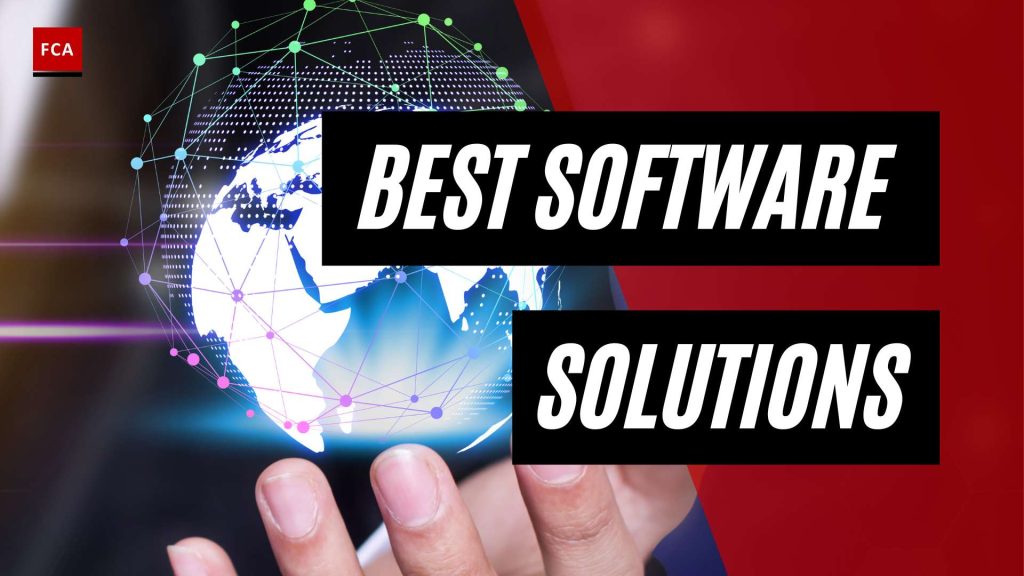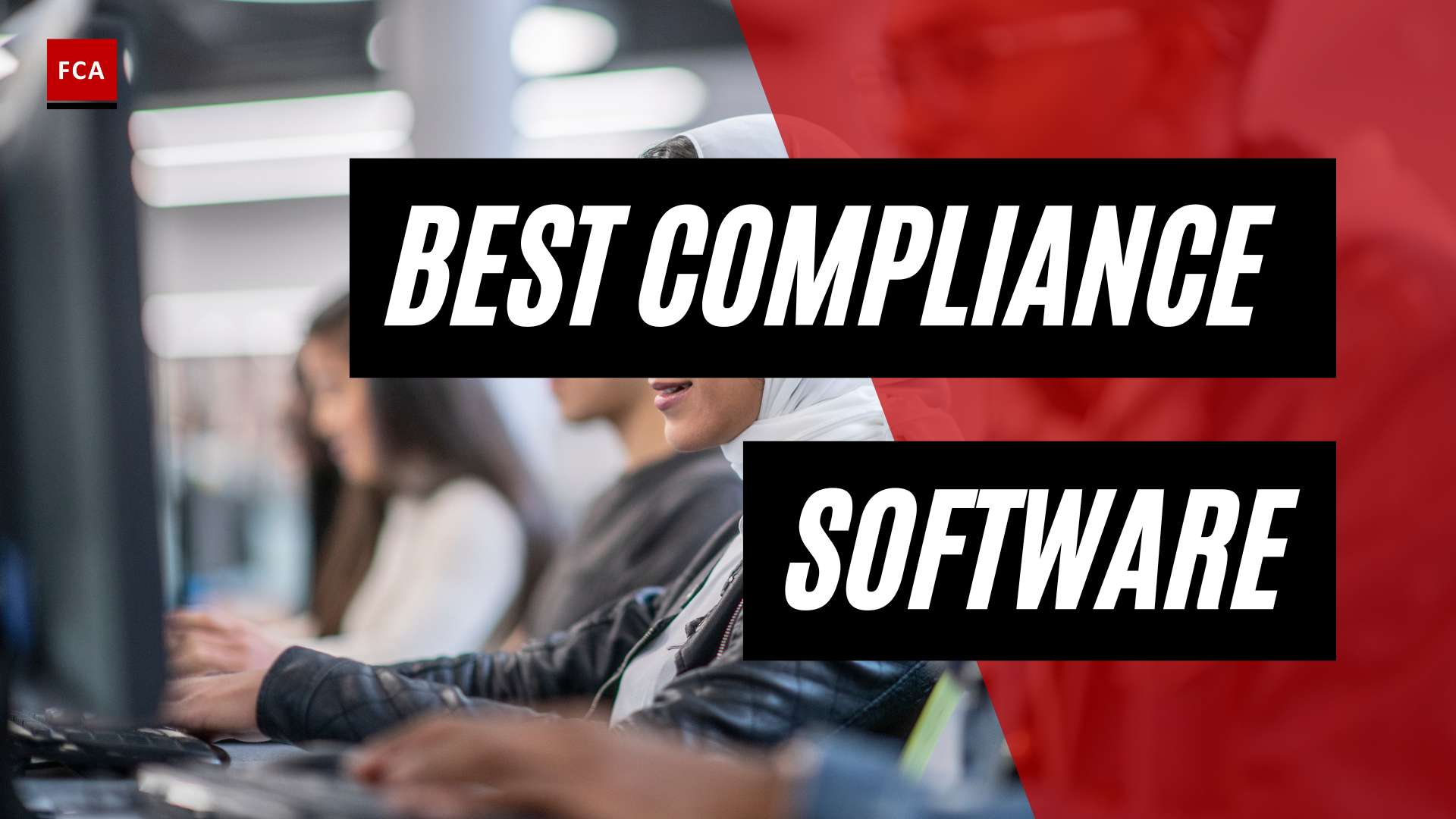The Importance of Compliance Software Solutions
Compliance software solutions play a crucial role in today’s business landscape by helping organizations streamline regulatory compliance and automate compliance tasks. These software solutions provide a range of benefits that contribute to efficient compliance management and ensure adherence to relevant standards and guidelines.
Streamlining Regulatory Compliance
Implementing compliance software solutions is a valuable way to keep up with regulatory changes. These software solutions assist organizations in monitoring and managing changes in regulations, automating tasks such as tracking updates, managing compliance documents, and generating reports. By utilizing compliance software, businesses can streamline their compliance processes and stay ahead of evolving regulatory requirements (Perillon). This ensures that the organization remains compliant with applicable laws and regulations, reducing the risk of penalties, fines, and reputational damage.
Automating Compliance Tasks
One of the key advantages of compliance software solutions is their ability to automate compliance tasks. These solutions help organizations efficiently manage their compliance obligations by automating processes such as tracking regulatory changes, updating policies and procedures, and monitoring compliance activities. By automating these tasks, compliance software solutions save time and reduce the likelihood of human errors. This allows employees to focus on more strategic and value-added activities, rather than spending excessive time on manual compliance tasks (Perillon).
Automation provided by compliance software solutions also facilitates the tracking of updates to regulations and standards. This ensures that organizations stay informed about any changes that may impact their compliance requirements. By receiving timely notifications and updates, businesses can proactively adapt their compliance practices to remain compliant with the latest regulations.
Furthermore, compliance software solutions enable organizations to generate reports and documentation necessary to demonstrate adherence to regulatory requirements. These solutions provide standardized reporting templates and consolidate compliance data, making it easier to generate comprehensive reports for internal and external stakeholders. This helps organizations demonstrate their commitment to compliance, improve transparency, and streamline regulatory reporting processes.
By leveraging compliance software solutions, organizations can effectively navigate the complex landscape of regulatory compliance. These solutions offer time-saving features, automation capabilities, and reporting functionalities that enhance compliance management practices. Whether it is in the cosmetics sector, healthcare providers, or aerospace and defense companies, compliance software solutions provide the necessary tools to ensure adherence to industry-specific regulations (Source Intelligence). With the help of these software solutions, businesses can effectively manage compliance, mitigate risk, and safeguard their operations in an ever-changing regulatory environment.
Benefits of Compliance Software Solutions
Compliance software solutions play a vital role in helping organizations effectively navigate the complex landscape of regulatory requirements. These solutions offer numerous benefits, including efficient monitoring of regulatory changes, task automation and tracking updates, and generating reports to ensure adherence to applicable standards and guidelines.
Efficient Monitoring of Regulatory Changes
Regulatory changes occur frequently, and staying up-to-date can be a daunting task for organizations. Compliance software solutions provide a streamlined approach to monitoring regulatory changes. By automating this process, organizations can receive timely updates and notifications regarding new regulations, amendments, or revisions. This allows them to proactively assess the impact of these changes on their operations and take the necessary steps to remain compliant. Compliance software solutions act as a central repository of regulatory information, ensuring that organizations are well-informed about the latest developments.
Task Automation and Tracking Updates
Compliance tasks can be time-consuming and prone to human error. Compliance software solutions alleviate these challenges by automating various tasks, such as tracking updates and managing compliance documents. These solutions enable organizations to create automated workflows, assign tasks, and track their progress. By reducing manual effort, compliance software solutions enhance efficiency and accuracy in compliance-related processes.
Organizations can also benefit from the ability of compliance software solutions to track updates and document changes. These solutions provide an audit trail, allowing organizations to demonstrate their compliance efforts and maintain a record of regulatory changes over time. This feature is particularly valuable during audits or regulatory inspections.
Generating Reports and Ensuring Adherence
Compliance reporting is a critical aspect of regulatory compliance. Compliance software solutions simplify the process of generating reports by automating data collection and analysis. These solutions can generate comprehensive reports that provide insights into an organization’s compliance status, highlight areas of non-compliance, and track corrective actions taken. By facilitating the generation of accurate and detailed reports, compliance software solutions enable organizations to demonstrate their adherence to regulatory requirements.
Moreover, compliance software solutions can help organizations ensure ongoing adherence to regulatory standards. By setting up reminders and notifications, these solutions prompt organizations to conduct regular compliance checks, perform internal audits, and implement necessary corrective actions. This proactive approach helps organizations maintain compliance and mitigate the risk of non-compliance.
By utilizing compliance software solutions, organizations can benefit from efficient monitoring of regulatory changes, task automation and tracking updates, and generating reports to ensure adherence to regulatory requirements. These software solutions not only enhance compliance processes but also contribute to risk management and operational efficiency.
Industries that Benefit from Compliance Software
Compliance software solutions play a crucial role in various industries, helping organizations navigate complex regulatory landscapes and ensure adherence to legal requirements. Here are three industries that greatly benefit from the use of compliance software:
Cosmetics Sector
In the cosmetics sector, compliance management software is of utmost importance due to the industry’s need to navigate various regulations. This includes regulations surrounding the use of chemicals, product safety, and human trafficking laws. Companies in the cosmetics sector can leverage compliance software solutions to automate processes and documentation handling, ensuring compliance with applicable regulations and avoiding fines and reputational damage. By streamlining compliance efforts, cosmetic companies can focus on innovating and bringing safe products to market. For more information, refer to our article on compliance software for banks.
Healthcare Providers
Compliance management software is essential for healthcare providers to meet stringent regulations and maintain patient data security. The Health Insurance Portability and Accountability Act (HIPAA) imposes strict requirements on the handling and protection of sensitive patient information. Healthcare facilities can leverage compliance software solutions to automate data collection, track regulatory changes, and ensure that requirements are met. By streamlining compliance processes, healthcare providers can avoid closures, financial penalties, and reputational damage. For more information, refer to our article on aml compliance software.
Aerospace and Defense Companies
Aerospace and defense companies operate within a highly regulated environment, requiring compliance with stringent regulations governing their supply chains. These regulations ensure safety, security, and quality control. Compliance management software enables aerospace and defense companies to track compliance requirements, monitor suppliers’ adherence to regulations, and maintain accurate documentation. Effective compliance software solutions assist in fulfilling regulatory obligations and mitigating risks, including those related to emerging frameworks such as the Cybersecurity Maturity Model Certification (CMMC). By leveraging compliance software, aerospace and defense companies can avoid penalties, maintain regulatory compliance, and safeguard their operations. For more information, refer to our article on fraud detection software.
By utilizing compliance software solutions, organizations in the cosmetics sector, healthcare industry, and aerospace and defense sector can streamline their compliance efforts, automate tasks, and ensure adherence to regulatory requirements. These software solutions enhance efficiency, reduce human errors, and help companies stay up to date with evolving regulations.
Key Features to Look for in Compliance Software Solutions
When considering compliance software solutions, it’s important to look for key features that will meet your organization’s specific needs. These features can enhance efficiency, streamline processes, and ensure adherence to regulatory requirements. Here are three essential features to consider:
Customizable Dashboards and Entity Management
Compliance software solutions should provide customizable dashboards and entity management features to effectively organize and track compliance-related information. These features allow you to securely store and access documents related to entities, such as licensing forms, certificates of good standing, and company bylaws. With customizable dashboards, you can prioritize and display the most relevant information for quick and efficient access. This functionality facilitates easy monitoring of compliance status and helps ensure that all necessary documents and information are up to date. For more information on entity management, refer to 3H Corporate Services.
Integration with Other Software Systems
Integration with other software systems, such as accounting and billing software, is crucial for seamless workflow and data management. By integrating compliance software with existing systems, you can automate processes, improve operational efficiency, and streamline entity management. This integration eliminates the need for manual data entry and reduces the potential for errors. It also allows for better coordination between departments and saves time and money. Look for compliance software solutions that offer robust integration capabilities to optimize your workflow. To learn more about the importance of integration, refer to 3H Corporate Services.
Compliance Documentation Management
Effective compliance software solutions should have comprehensive documentation management features. This includes the ability to securely store and manage compliance-related documents, such as policies, procedures, regulations, and audit reports. The software should provide version control, document tracking, and easy retrieval functionalities to ensure that the most current and accurate information is accessible to relevant stakeholders. Compliance documentation management helps maintain compliance with legal and regulatory requirements and supports audit readiness. It also fosters transparency and accountability within the organization. Consider compliance software solutions that offer robust documentation management capabilities to enhance your compliance processes. For more insights into compliance documentation management, refer to ELMA365.
By prioritizing these key features in your search for compliance software solutions, you can effectively streamline your compliance processes, improve efficiency, and ensure adherence to legal and regulatory requirements. Remember to assess your organization’s specific needs and select a solution that aligns with your industry requirements and long-term compliance goals.
Cost and Time Savings with Compliance Software
Implementing compliance software solutions offers numerous benefits, including cost and time savings. Let’s explore some of the key ways in which compliance software can help organizations save resources and streamline their compliance efforts.
Reduction of Human Errors
One of the primary advantages of compliance software is its ability to minimize human errors. Manual compliance processes are susceptible to mistakes, which can have serious consequences for organizations. By automating compliance tasks through software solutions, the risk of human error is significantly reduced. This leads to greater accuracy and ensures that compliance requirements are consistently met. The reduction of errors not only saves time but also helps organizations avoid costly penalties and reputational damage.
Going Paperless and Digital Storage
Traditional compliance processes often involve extensive paperwork and physical document storage. However, compliance software enables organizations to go paperless by digitizing their compliance records. This shift not only saves costs associated with physical document storage but also ensures compliance with legal requirements to retain documentation for at least ten years. With digital storage solutions, organizations can efficiently manage and access compliance records, eliminating the risk of losing essential documents and enhancing overall efficiency.
Cloud-Based Solutions for Efficiency and Collaboration
Cloud-based compliance software solutions offer a range of benefits that contribute to cost and time savings. By utilizing cloud-based platforms, organizations can access their compliance data from anywhere at any time, allowing for greater flexibility and remote collaboration. With real-time updates and centralized data storage, teams can work together seamlessly, improving efficiency and reducing the need for in-person meetings. Furthermore, cloud-based solutions eliminate the need for physical infrastructure and storage, saving office space and associated costs.
The enhanced visibility and collaboration provided by cloud-based compliance software solutions also contribute to better compliance practices. Organizations can stay informed about regulatory changes, ensuring that they remain compliant with evolving requirements. This proactive approach not only saves time but also reduces the risk of non-compliance penalties and reputational damage.
By leveraging compliance software solutions, organizations can achieve significant cost and time savings. The reduction of human errors, transition to paperless and digital storage, and adoption of cloud-based solutions all contribute to enhanced efficiency, streamlined processes, and better resource utilization. These benefits not only save organizations money but also contribute to a culture of compliance and risk mitigation.
Ensuring Compliance with Legal Requirements
Compliance with legal requirements is a critical aspect of running a business, and utilizing compliance software solutions can help organizations navigate the complexities of various regulations. In this section, we will explore the importance of compliance for global regulations, the benefits of compliance software for insurance companies, and the significance of workplace health and safety compliance.
Compliance for Global Regulations
Expanding businesses must comply with global regulations to avoid heavy fines, closures, and other penalties. The Companies (Auditor’s Report) Order (CARO) 2020 emphasizes a zero-tolerance approach to non-compliance, requiring auditors to report any fraudulent activities within companies (Source Intelligence). Implementing compliance management software is essential for businesses to safeguard their continuous operation and ensure adherence to global regulations. Customizable dashboards, entity management, and integration with other software systems are key features to look for in compliance software solutions. These tools enable businesses to stay updated with regulatory changes, automate compliance tasks, and generate reports to demonstrate adherence.
Benefits for Insurance Companies
Insurance companies have unique compliance requirements due to the nature of their operations. Compliance software solutions provide significant benefits to insurance companies by ensuring adherence to regulations and minimizing the risk of closure or sanctions. By utilizing compliance software, insurance companies can effectively manage and reduce risk by creating organizational charts, highlighting potential issues, filing reports with regulatory bodies, and receiving notifications to address concerns before they escalate (Diligent). This proactive approach to compliance helps insurance companies maintain their reputation, avoid financial penalties, and ensure the trust of policyholders and regulatory authorities.
Workplace Health and Safety Compliance
Workplace health and safety compliance is of utmost importance to protect employees and maintain a safe working environment. Compliance software solutions play a vital role in automating compliance processes and increasing accuracy. By automating tasks such as safety inspections, incident reporting, and training management, organizations can reduce the risk of human error and ensure timely completion of compliance-related tasks (RiskMach). Compliance software also offers great reporting features and collaboration functionality, enhancing the overall compliance process. Going paperless through the use of digital storage solutions eliminates the cost of physical document storage and ensures compliance with legal requirements to retain documentation for at least ten years (RiskMach). Cloud-based compliance software solutions provide better visibility, collaboration, information security protocols, continuous maintenance, and support, enabling organizations to stay informed about regulatory changes and enhance workplace safety (RiskMach).
By leveraging compliance software solutions, organizations can ensure compliance with legal requirements, mitigate risks, and maintain a culture of integrity and accountability. Whether it’s complying with global regulations, meeting the unique requirements of insurance companies, or prioritizing workplace health and safety, compliance software provides the necessary tools to streamline processes, enhance efficiency, and protect the interests of the organization and its stakeholders.
The Role of Compliance Software in Risk Management
Compliance software plays a crucial role in effective risk management by automating compliance processes, increasing agility and accuracy, and reducing costs and financial penalties.
Automating Compliance Processes
One of the key benefits of compliance software solutions is the automation of compliance processes. By leveraging technology, organizations can streamline and standardize their compliance activities, ensuring consistency and efficiency across the board. Tasks such as policy management, risk assessments, and audit trails can be automated, reducing the burden on compliance officers and freeing up their time to focus on more strategic and high-value tasks. Automation also helps in reducing human errors and ensuring that compliance activities are conducted in a timely manner, minimizing the risk of non-compliance and associated penalties.
Increased Agility and Accuracy
Compliance software solutions enable organizations to stay agile in a rapidly changing regulatory landscape. With the ability to proactively track and monitor regulatory changes, compliance software keeps organizations informed and ensures they can quickly adapt their compliance programs to meet new requirements. By providing real-time updates and alerts, compliance software helps organizations stay ahead and make informed decisions. This increased agility allows organizations to mitigate compliance risks effectively.
Furthermore, compliance software enhances accuracy in compliance activities. The software ensures that compliance tasks are performed consistently and according to predefined standards. By automating data collection and analysis, compliance software minimizes the risk of manual errors and provides accurate and reliable information for decision-making.
Cost Reduction and Financial Penalties
Implementing compliance software solutions can lead to significant cost savings for organizations. Automation reduces the need for manual labor in compliance processes, resulting in operational cost reduction. By automating compliance monitoring and reporting, organizations can minimize the risk of human errors and associated costs. Compliance software also helps organizations avoid financial penalties by proactively tracking regulatory changes, ensuring that compliance obligations are met in a timely manner.
Compliance software solutions contribute to risk management by ensuring that organizations adhere to regulatory requirements, reducing the likelihood of non-compliance incidents that can result in financial penalties and reputational damage. By automating compliance processes, increasing agility and accuracy, and reducing costs, compliance software plays a vital role in effective risk management within organizations.
To learn more about compliance software solutions and their benefits, check out our articles on fraud detection software, regulatory compliance software, and anti-money laundering software.
Keeping Up with Regulatory Changes
To effectively navigate the ever-evolving landscape of regulatory requirements, organizations need compliance software solutions that can keep up with the pace of change. These solutions offer automation and artificial intelligence capabilities, streamlined reporting processes, and enhanced risk management practices.
Automation and Artificial Intelligence
Compliance software solutions leveraging automation and artificial intelligence (AI) can greatly assist organizations in keeping up with regulatory changes. These technologies can efficiently identify risks and ensure regulatory compliance, leading to more effective risk management practices (Planet Compliance). By automating compliance processes and leveraging AI algorithms, organizations can analyze vast amounts of data, identify patterns, and detect anomalies that may indicate potential compliance issues. This proactive approach enables organizations to address compliance requirements promptly and mitigate risks effectively.
Streamlined Reporting Processes
One of the key challenges in compliance management is the timely and accurate reporting of regulatory information. Compliance software solutions play a crucial role in streamlining reporting processes, improving accuracy, enhancing data quality, and increasing efficiency in meeting reporting deadlines (Planet Compliance). These solutions provide a centralized platform for data collection, validation, and reporting, reducing manual effort and minimizing the risk of errors. By automating reporting processes, organizations can generate comprehensive reports that demonstrate adherence to regulatory requirements, making compliance audits smoother and more efficient.
Enhancing Risk Management Practices
Compliance software solutions contribute to enhancing risk management practices by providing organizations with real-time updates on changing regulations. These solutions enable organizations to stay informed about the latest regulatory developments, ensuring that their compliance programs are up to date and aligned with current requirements. By centralizing compliance data and providing comprehensive overviews of an organization’s status, compliance software solutions empower nimble actions and strategic decision-making (Diligent). By leveraging the insights and analysis provided by these tools, organizations can proactively identify and address compliance risks, minimizing the potential for financial penalties and reputational damage.
By utilizing compliance software solutions with automation, AI capabilities, streamlined reporting processes, and enhanced risk management practices, organizations can stay ahead of regulatory changes. These solutions empower compliance professionals to efficiently manage compliance tasks, adapt to evolving regulatory requirements, and ensure adherence to legal obligations. In an ever-changing regulatory landscape, compliance software solutions are invaluable tools for organizations across various industries, including banking, finance, healthcare, and more.








